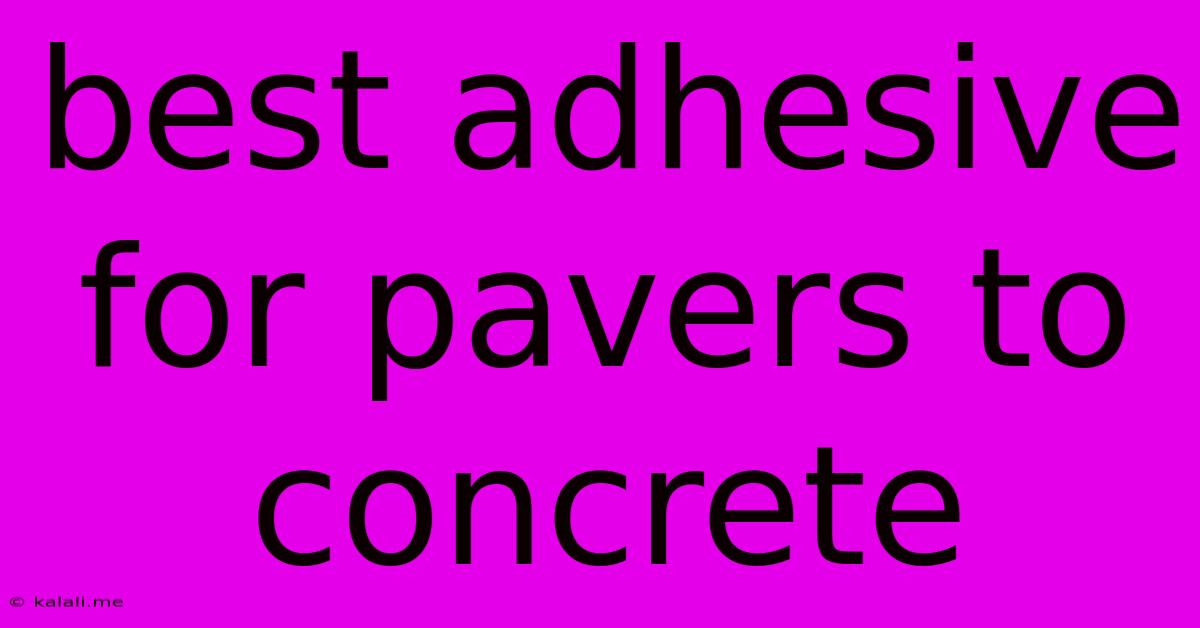Best Adhesive For Pavers To Concrete
Kalali
Jun 06, 2025 · 3 min read

Table of Contents
Best Adhesive for Pavers to Concrete: A Comprehensive Guide
Choosing the right adhesive is crucial for a long-lasting and aesthetically pleasing paver installation on concrete. A strong bond prevents shifting, cracking, and weed growth, ensuring your patio, walkway, or driveway remains beautiful for years to come. This guide explores the best adhesives for this specific application, considering factors like project scale, material type, and environmental conditions. We'll delve into the pros and cons of various options to help you make an informed decision.
Understanding the Importance of Proper Adhesion
Before diving into specific adhesives, it's vital to understand why proper adhesion is paramount when attaching pavers to concrete. Poorly adhered pavers can lead to several problems:
- Shifting and Settling: Over time, shifting pavers create uneven surfaces, tripping hazards, and an unsightly appearance.
- Cracking: Movement caused by poor adhesion can crack both the pavers and the underlying concrete.
- Weed Growth: Gaps between pavers and the concrete substrate provide ideal conditions for weeds to take root, requiring constant maintenance.
- Water Damage: Water can seep beneath poorly bonded pavers, leading to frost damage and weakening the concrete base.
Types of Adhesives for Pavers on Concrete
Several adhesive types are suitable for bonding pavers to concrete, each with its strengths and weaknesses:
1. Modified Thin-Set Mortar: This is a popular choice for its versatility and strong bond. Modified thin-set mortars contain polymers that enhance their adhesive properties, flexibility, and water resistance. They are suitable for various paver materials, including natural stone, concrete, and clay. Key advantages: strong bond, relatively easy to apply, good water resistance. Considerations: Requires some skill for even application to avoid voids.
2. Epoxy Mortar: Epoxy mortars offer superior strength and adhesion compared to modified thin-set mortars, especially in demanding conditions. They are exceptionally durable and resistant to chemicals and water. Key advantages: exceptional strength and durability, excellent chemical and water resistance. Considerations: More expensive than thin-set mortar, requires precise mixing and application, and can be challenging for larger projects.
3. Construction Adhesive: Certain construction adhesives, specifically those designed for exterior use and labeled for paver installation, provide a strong bond. They are often easier to apply than mortars, making them suitable for smaller projects or DIY applications. Key advantages: Easy application, good bonding strength for many applications. Considerations: May not be as durable or water-resistant as mortars in high-traffic areas or harsh climates.
Factors to Consider When Choosing an Adhesive
Several factors influence the best adhesive choice for your project:
- Paver Material: The type of paver (concrete, brick, natural stone) affects the adhesive's required strength and flexibility.
- Project Size: For large projects, a high-performance adhesive like epoxy mortar might be cost-effective despite the higher initial cost due to its superior longevity. Smaller projects may benefit from the easier application of construction adhesive.
- Environmental Conditions: Exposure to extreme temperatures, freezing, and thawing cycles demands a highly durable and water-resistant adhesive like epoxy.
- Substrate Condition: The concrete surface must be clean, dry, and free of debris for optimal adhesion. Proper surface preparation is as important as the adhesive itself.
Application Tips for Optimal Results
Regardless of the adhesive chosen, proper preparation and application are crucial:
- Clean the Concrete: Thoroughly clean the concrete surface, removing any dirt, grease, oil, or loose particles.
- Prime if Necessary: Some adhesives require priming the concrete surface for optimal adhesion.
- Follow Manufacturer's Instructions: Always follow the adhesive manufacturer's instructions regarding mixing ratios, application methods, and curing times.
- Ensure Even Distribution: Avoid voids and ensure the adhesive is evenly distributed between the paver and the concrete.
- Proper Curing: Allow sufficient curing time before subjecting the pavers to traffic or heavy loads.
By carefully considering the factors outlined above and selecting the appropriate adhesive, you can ensure a durable and aesthetically pleasing paver installation that will withstand the test of time. Remember, investing in quality materials and proper installation techniques will save you time and money in the long run.
Latest Posts
Latest Posts
-
Where Arc Fault Breakers Are Required
Jun 06, 2025
-
Whats Another Word For Vivid Memory
Jun 06, 2025
-
How Do You Get Brake Dust Off Rims
Jun 06, 2025
-
How To Delete An Observance On My Samsung Phone
Jun 06, 2025
-
Is The Signature The Same As A Transaction Id Crypto
Jun 06, 2025
Related Post
Thank you for visiting our website which covers about Best Adhesive For Pavers To Concrete . We hope the information provided has been useful to you. Feel free to contact us if you have any questions or need further assistance. See you next time and don't miss to bookmark.